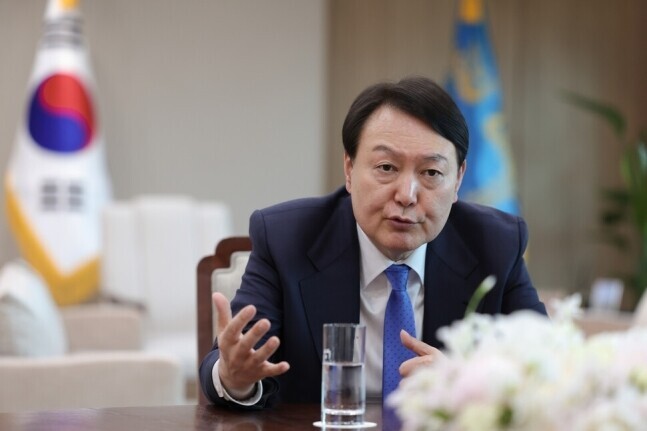hankyoreh
Links to other country sites 다른 나라 사이트 링크
Yoon’s abrupt policy assertions with foreign press prompt concern ahead of US summit

South Korean President Yoon Suk-yeol has repeatedly made unilateral decisions and announcements about diplomatic matters directly related to national security or the human rights of victims without adequately clearing those matters with the public. Critics say that Yoon has been undermining the government’s leverage in negotiations by showing his hand in advance.
In an interview with Reuters on Wednesday, Yoon hinted at the possibility of providing military aid to Ukraine in its war with Russia.
“If there is a situation the international community cannot condone, such as any large-scale attack on civilians, massacre or serious violation of the laws of war, it might be difficult for us to insist only on humanitarian or financial support,” the Korean president said.
That strikes a different note from the Korean government’s policy of not providing Ukraine with any deadly weapons.
Yoon made these sensitive comments in an interview with a foreign press outlet leading up to his visit to the US on Monday. They provoked immediate pushback from Russia, which said any military aid for Ukraine would represent a partial intervention in the war.
The Korean government has dismissed all rumors that it might provide arms to Ukraine without making an adequate effort to canvass public opinion. Even worse, the issue could come up in Yoon’s summit with US President Joe Biden in Washington on Wednesday.
That leaves Yoon open to criticism for showing his hand too soon.
Yoon and the presidential office exhibited a similar attitude around the Korea-Japan summit held last month.
“This isn’t the sort of solution that will lead to exercising the right to indemnity down the road,” Yoon said in an interview with Japanese newspaper the Yomiuri Shimbun that went to press on March 15, one day before his summit with Japanese Prime Minister Fumio Kishida. Yoon was referring to his third-party repayment plan under which the Korean government would pay damages to victims of forced labor during Japan’s colonial rule over Korea, rather than direct compensation from Japanese companies that used this coercive labor.
Once again, the Korean government had revealed its intentions without bothering to seek public opinion.
On Jan. 16, an official from the Korean Foreign Ministry said that Korea had told Japan that an apology and sincere corresponding actions were needed and that no plan would be announced without them. That came after a meeting between Seo Min-jung, director-general for Asian and Pacific Affairs at Korea’s Foreign Ministry, and Takehiro Funakoshi, director-general of the Asian and Oceanian affairs bureau at Japan’s Foreign Ministry, while negotiations were still underway.
As criticism mounted following the summit, Yoon underlined the boldness of his decision on March 21: “I could have been the kind of president who ignores relations with Japan, even though they’re at their worst point in history. But I thought I would be abdicating my responsibility as president if I sought to use hostile nationalism and anti-Japanese sentiment as fodder for domestic politics.”
“If South Korea makes the first move to clear away these obstacles, Japan is sure to respond in kind,” Yoon added.
So far, however, the Japanese government hasn’t responded.
Experts point out that Yoon’s unilateralism poses diplomatic and security risks.
“I presume he had his upcoming trip to the US in mind when he gave that interview. There needs to be some positive impact on the national interest, but in this situation, it’s more likely to be a minus,” said Park Chong-soo, former chair of the Presidential Committee on Northern Economic Cooperation.
“I’m not sure why he would have given that kind of interview to the foreign press.”
By Shin Hyeong-cheol, staff reporter
Please direct questions or comments to [english@hani.co.kr]

Editorial・opinion
![[Editorial] Korea must respond firmly to Japan’s attempt to usurp Line [Editorial] Korea must respond firmly to Japan’s attempt to usurp Line](https://flexible.img.hani.co.kr/flexible/normal/500/300/imgdb/original/2024/0514/2317156736305813.jpg) [Editorial] Korea must respond firmly to Japan’s attempt to usurp Line
[Editorial] Korea must respond firmly to Japan’s attempt to usurp Line![[Editorial] Transfers of prosecutors investigating Korea’s first lady send chilling message [Editorial] Transfers of prosecutors investigating Korea’s first lady send chilling message](https://flexible.img.hani.co.kr/flexible/normal/500/300/imgdb/original/2024/0514/7917156741888668.jpg) [Editorial] Transfers of prosecutors investigating Korea’s first lady send chilling message
[Editorial] Transfers of prosecutors investigating Korea’s first lady send chilling message- [Column] Will Seoul’s ties with Moscow really recover on their own?
- [Column] Samsung’s ‘lost decade’ and Lee Jae-yong’s mismatched chopsticks
- [Correspondent’s column] The real reason the US is worried about Chinese ‘overcapacity’
- [Editorial] Yoon’s gesture at communication only highlights his reluctance to change
- [Editorial] Perilous stakes of Trump’s rhetoric around US troop pullout from Korea
- [Guest essay] Preventing Korean Peninsula from becoming front line of new cold war
- [Column] The state is back — but is it in business?
- [Column] Life on our Trisolaris
Most viewed articles
- 1[Editorial] Transfers of prosecutors investigating Korea’s first lady send chilling message
- 2Korea cedes No. 1 spot in overall shipbuilding competitiveness to China
- 3Major personnel shuffle reassigns prosecutors leading investigations into Korea’s first lady
- 4[Editorial] Korea must respond firmly to Japan’s attempt to usurp Line
- 5US has always pulled troops from Korea unilaterally — is Yoon prepared for it to happen again?
- 6Second suspect nabbed for gruesome murder of Korean in Thailand, 1 remains at large
- 7Naver’s union calls for action from government over possible Japanese buyout of Line
- 8Korean auto industry on edge after US hints at ban on Chinese tech in connected cars
- 9[Correspondent’s column] The real reason the US is worried about Chinese ‘overcapacity’
- 10[Column] Samsung’s ‘lost decade’ and Lee Jae-yong’s mismatched chopsticks